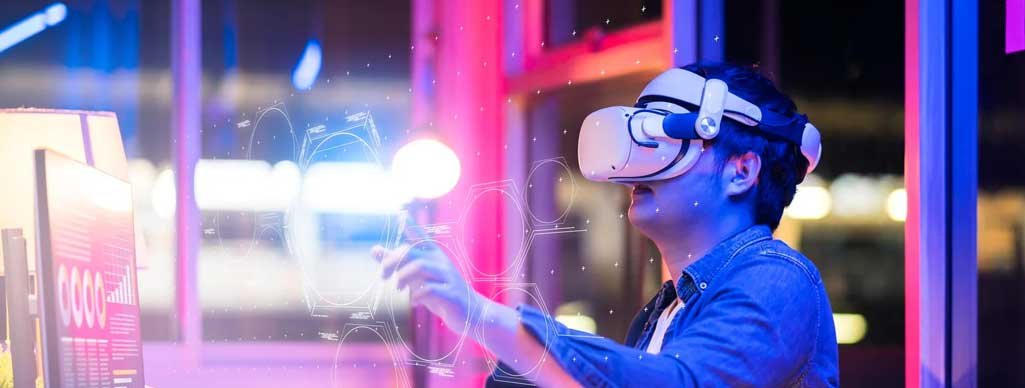
Athar Jamal, EIL
jamal.athar@eil.co.in

Abstract
The disease, which no one thought of, shattered the world in no less than six months and has emerged as a trend setter of sorts giving rise to the new world. After Covid-19, people’s life style has completely changed-use of Mobile phones, Tablets, Laptops, Desktop has increased, which has impacted the screen time as well. Demand of internet usage increased enormously. The internet usage has helped the people in various ways like doing office work from home, arrangement of online meetings; e-Learning got prevalent, online shopping became common, people preferred ordering food online instead of dining in the restaurants and the list is endless. In short, people began thinking beyond the given and behavioural changes have occurred.
This article would cite some of the points based on this trend change where people started living differently and adopted online mode as their preferred mode of functioning which has not only made their life simple but also convenient.
On the evening of 24thMarch 2020, the Government of India ordered a nationwide lockdown for 21 days, limiting movement of the entire 1.38 billion (138 crore) population of India as a preventive measure against the COVID-19 pandemic in India.[1] This created a huge panic among the citizens of India and due to complete lockdown some people rushed down the streets for buying their necessary household items; some ran to railway stations and even to airports to go back to their hometowns. A disturbing situation was witnessed by the people of India.
Since then it is now almost two years and we can see a lot of change the Indian people as well as the world has adopted. Back then in 2020, the virus was very new to us so everyone was scared but now people got habituated and began working to boost the economy. A new lifestyle has been created due to this pandemic. A behavioural change has occurred among the people of India as well as in the world. Studies say that 86% of the Indians have adopted online shopping during the pandemic thus indicating accelerated adoption of e-commerce across all age group [2]. Dining into the restaurants has reduced to a large extent and ordering food online has picked up speed. Food delivery Companies like Swiggy and Zomato helped a lot in enabling this change. Wearing masks and social distancing has become the new normal. People stopped going to offices and started working from home which gave them huge flexibility and also saved the time spent on commuting daily to work. Yet, all this would not have been possible if we wouldn’t have had the internet which has led to greater connectivity. Arrangement of online meetings has become an unusual standard which back then was never the case. People started adopting this online mode of communication and now it has become the part of our new world.
Learning systems also got impacted due to the pandemic since the schools were shut and students were no longer getting any teachings from their teachers through traditional mode of learning. Nevertheless, the changed world has adopted the online mode of learning or e-Learning through which lakhs of students are getting taught and improving their knowledge and skills. This e-Learning has also benefitted the people who are not inclined towards the traditional mode of education and can now learn by enrolling various courses and increase their knowledge and skills irrespective of their location and time zones.
The pandemic also created entrepreneurs who gave new ideas to the Nation. Though several jobs were lost but at the same time the entrepreneurial skills saved the day for many. According to the economic times, there has been a massive 26% surge in the new company incorporation in FY21 [3]. A huge contribution to this new India was given by many young entrepreneurs who in turn added to the growth of the Nation.
The list could be never ending. I can keep on citing examples that have changed the people’s behavior but, will these things exist forever? Data says that India has only around 50% of internet penetration which means half of the country’s population was unable to access the internet [4]. This shows that half of the population was unable to acquire the knowledge and skill during the pandemic. There is a big question mark over here. How to sort out this gap is what we should really think about? In my views, internet penetration may be increased by following few steps. Some of them are as follows:
Development of good network coverage in the remotest place i.e. a good networking of cellular tower should be implemented. Government should work along with some private bodies to increase the internet penetration.
Affordability of internet, though Reliance Jio has done to some extent but the way price is increasing people living in the rural areas does not have that much of purchasing power.
Smart phones and Tablets have come to the affordable range but for rural people it is still a challenge. So affordability for them needs to be increased by giving some subsidy.
Government should announce some digital related schemes and try to educate the rural people and increase their awareness.
Knowledge of smart classes should be share in schools of rural areas.
If we can take some measures mentioned above, then possibly we can imagine people in the rural areas are also taking online classes and are connected to each other through internet. But this could be only possible when the rural literacy rate is increased which is now roughly at 71% only. [5]
According to economic times India is expected to increase its internet users by 45 percent in the next five years and this increase will be driven by higher adoption in rural areas. [6] If this really happens than that would transform India and would make it accountable among the internet users globally.
The pandemic has taught us a lot of things and we need to learn from it which should be implemented for our future growth. Lastly, I would like to conclude by a famous quote: Remember that life’s greatest lessons are usually learned at the worst times and from the worst mistakes.
References:
Wikipedia
Businessinsider.in, Shopify
Economic Times
Statista.com
Economic Times
Economic Times
Posted in Talent Management | No Comments »
Recent Articles
- Role of Leaders in Team Network Interpersonal Skills
- Unlocking the Tapestry of Learning & Development: a Journey through Time & Networks
- Aarohi – As The Flight Leaves The Land
- 20% Time – Innovation through playfulness
- Workplace Culture of Playfulness: Creating an environment of humour and positivity
- We Aren’t Paying Enough Attention to Humor in the Workplace
- Three quotients to manage talent
- Seriously, What’s so Funny?
- Happy Souls at Work: Playfulness Well-being Productivity
- The Joy of Work: Building a Culture Where Playfulness Meets Performance
- Corporate Learnings from ‘Mogambo’ – The Iconic Villain of Indian Film Mr. India
- Talent Development and Succession Planning for Organizational Sustainability
- An Ideal Workplace – Happy & Fun!
- The role of leadership in encouraging a playful environment
- Injecting Joy into Work: The Benefits of a Playful Office Culture
- Five on Five: Five Leadership Styles for Five Generations ACT & LEAD!
- The CEO’s Dharma: Leadership Lessons from Narada’s Inquiry
- 3-D Leader: BANI and Heart Economy
- The Talent Management Odyssey: A Quest for the Holy Grail of HR
- Generation Z in the Workforce: Challenges and Opportunities
- Talent Management in Post-Independent Indian Governance- A Case Study
- Pareto Principle in the Workplace
- Breaking Good: Sabbatical leave- A comprehensive insight
- Influencing V/S Manipulation
- Prosocial Emotions as Lever for Employee Engagement
- The Table with the lady
- Can Compassion and Executive Presence Co-exist
- Empathetic Organisations are not Built Overnight !
- Employee Excitement
- Women, Leadership and opportunities
- Corporate Diversity & Inclusion
- Connections in the time of Covid
- Developing connect with the missing shift employee
- Becoming the employer of choice in the new normal
- Open Secret to Build a Culture of Sustainability through GHRM (Green Human Resources Management)
- Green HRM: Building a Culture of Sustainability
- Cultural Lens
- Trust Credibility
- Organizational Culture and Covid-19: An employee’s perspective
- Culture: Fostering Values for Unleashing Human Potential
- Psychological safety in a team: Whose responsibility?
- “Dispelling the fear of failure – Nurturing innovation and experimentation”
- Fighting Fear through Growth Mindset & Experimentation
- Situational Leadership: A Brahmastra
- ONGC Succession Planning
- Leadership
- Unleashing the Power of failure and Innovation: A Call to Action for Indians in the 21st Century
- Managing Executive Obsolescence for Career Growth
- Action Learning
- The Best Coach to Rewire people
- The eLearning series: A practitioner’s take
- Learning in the Flow of Work – Lets step up the Game
- E-learning a practitioner’s take- Part 2
- The Forgetting Curve – The best ways of Memorising & Learning
- Leaders as teachers
- The New India – Post Covid
- Learning & Development Gamified
- About Fear, loneliness and Exile at Workplace
- My Journey as a Coach-Leader
- Lessons from Ramayana
- Delivering Happiness through CSR
- Story of positive transformation
- Conquering the fear of failure
- Role of organization culture and values in growth of human potential
- The cost of Failure is…Learning!
- Talent Experience
- CSR Initiatives: The Key Drivers for India’s Sustainable Development Growth
- Gaining Wisdom from the Mahabharata
- Six Thinking Hats – A Decision Making Technique
- Next Normal of Talent Acquisition
- Talent Experience
- Role of Spirituality in effective Human Resource Management
- The ‘next normal’ workplace – A generational perspective
- The Pursuit for Recognition
- How to make Innovation an integral culture of an Organization
- Nuturing Talent – For Organisational Growth
- How Google Sold Its Engineers on Management
- Talent Leadership: Perhaps the new Talent Management
- Words have Power
- The Ultimate Team Game!
- The ‘Feedback Fridays’
- Talent Experience
- Pursuit of Dominance
- How Does Anticipated Emotion from a Decision Outcome Determine Our Ethical Behaviour? A Working Paper
- Talent Management
- From failing to innovating: Role of HR in promoting experimentation
- Unleashing the Power of Talent Management: Lessons from History to Modern Day
- Embracing Evolution: Behavior-Based Hiring and Technological Synergy for Organization’s Future Workforce
- Transforming Workforce Recruitment
- Data-Driven Play: Leveraging Analytics in Gamified Hiring
- Rational Recipe To Recruitment: Future Of Hiring
- Redefining the hiring recipe: Recruiting candidates beyond the resume!
- The Power of Attitude: Why Employers Seek the Right Mindset
- Principles of Recruitment
